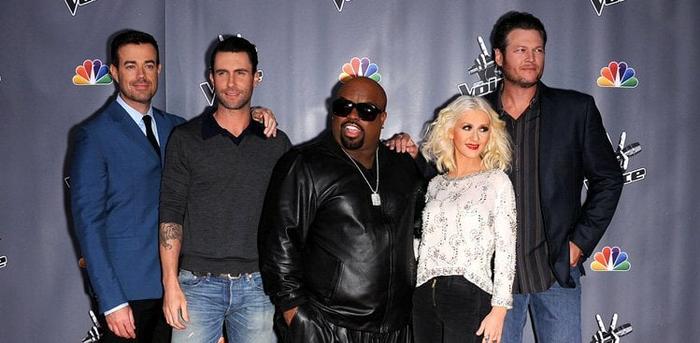
This week on The Voice, Blake Shelton told a male contestant (after a haircut and general sprucing up), “You’ve never looked hotter.”
Then he stole the singer for his own team.
And, OK, maybe if you get a haircut and spruce up your appearance, you’ll get that perfect job or hotly contested promotion. Studies show appearances do matter when it comes to raises and promotions.
But there’s more that you can take away from The Voice. Bromances aside, there are some great lessons to be learned from this reality show, and believe it or not, they apply directly to your own career—even if singing has nothing to do with it.
In case you’re not familiar with the show, here’s the premise: Four celebrity singer-coaches select teams of aspiring vocalists from a blind audition. Each coach’s contestants compete against each other in a weekly sing-off to determine who advances in the competition. Finally, the best from each coach compete against each other, and viewers vote to award the winner a recording contract. Along the way, coaches are allowed a certain number of steals and saves to keep their favorite contestants from being eliminated.
As I watched an episode this week, it struck me that the show holds some good lessons about the workplace that you can apply to your career.
Lesson #1. Your Boss Thinks You Can Make Him or Her Successful
On The Voice, coaches select vocalists they believe have the ability to lead them to a championship in the end. They aren’t looking to win only the weekly singing battles; they want to win the whole enchilada.
Your manager brought you on board for very much the same reason. I find it so interesting when people believe their managers aren’t on their side—because I know that no manager hires team members hoping they’ll cause the team to fail. No manager’s goal is to hire a problem employee who will give him or her a headache. Like the coaches on The Voice, bosses hire talent to win.
So if you’re struggling with your boss, or if you’re in a new job and it's not going so well, go back and ask your manager what she saw in you that convinced her to bring you on the team. Then do that with all your might.
Lesson #2. The Competition Doesn’t End With the Job Offer
Think about if you played a sport and had to train with your fiercest rival. How uncomfortable would that be?
On The Voice, that’s exactly what the singers do. They train with each other, the coach, and often a guest mentor, knowing that when they compete in the ring, only one of them will be victorious.
In the same way, sure, you got the job. But the competition doesn’t stop there. I like to say you first compete for the job. Then you compete in the job.
“The way to get things done is to stimulate competition,” steel magnate Charles M. Schwab once said. He did so by letting the night shift know how much steel the day shift had produced. Competition ensued.
For you, the same is true in the workplace. Consider that for stock options, plum assignments, promotions, title changes, and every dollar allotted for salary increases or bonuses, you’re competing with the colleagues around you. It may not be a public contest, but the idea is the same.
Much like the singers on The Voice, you continually have to prove you’re better than the others to get to the next level in compensation, responsibility, title, or reporting line. Consider what it is you’re competing for, and focus your performance on how you’re going to “win the title.”
Lesson #3. You’re Good; Someone Else May be Better
There’s always anguish when a coach has to choose between two great performers. One stays; one goes. But if the coach wants to win, he or she has to be brutal in making selections. Which singer best fits the strategy? Who has the best chance among the overall competition? Like I said—brutal.
There’s no room for keeping someone because he or she is nice or seems like a great person. The individual has to help the team win. Often, the difference between the one who stays and the one who goes is imperceptible. He or she is simply be a better fit for the coach’s strategy.
Managers do this all the time. As an employee, you may be good at what you do. But someone else may have a slight edge—just barely perceptible—that puts the “W” in his or her column for that raise or promotion.
However, you can still benefit when things don’t turn out in your favor. The coaches on The Voice help the deselected singers understand what drove the decision. Likewise, a good manager will help you understand why you win (something we often overlook asking, by the way) and why you don’t.
So whatever happens, be sure to get the feedback you need to continue improving. After all, a number of singers are on the program this year who had failed in earlier attempts. There’s something to be said for working at it.
For as hard as you work in the competition that is your career, thankfully, there’s one big difference that doesn’t apply to you: You don’t have to have your performance judged by millions of TV viewers.